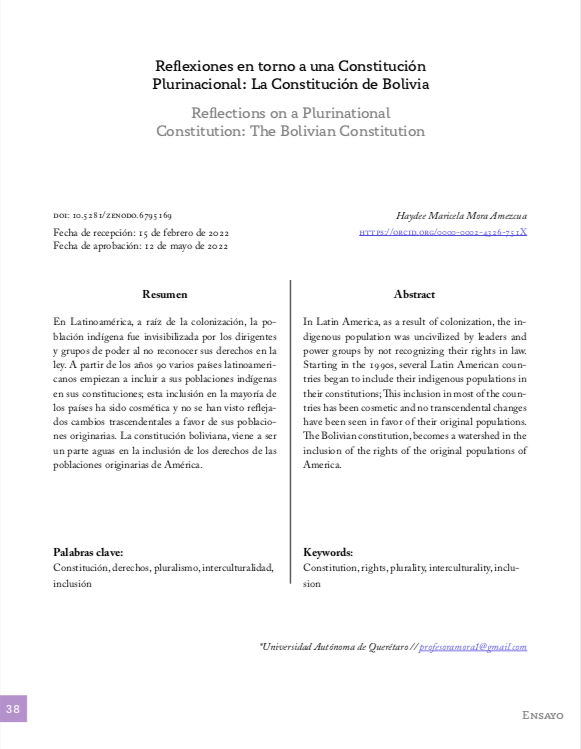
Keywords
rights
plurality
interculturality
inclusion
Abstract
In Latin America, as a result of colonization, the indigenous population was uncivilized by leaders and power groups by not recognizing their rights in law. Starting in the 1990s, several Latin American countries began to include their indigenous populations in their constitutions; This inclusion in most of the countries has been cosmetic and no transcendental changes have been seen in favor of their original populations. The Bolivian constitution, becomes a watershed in the inclusion of the rights of the original populations of America.

This work is licensed under a Creative Commons Attribution-NonCommercial-ShareAlike 4.0 International License.
Copyright (c) 2022 ALBORES
Similar Articles
- Mario Armando Vázquez Soriano, Editorial , Albores: Vol. 3 No. 5 (2024): Albores. Revista de Ciencias Políticas y Sociales
- Iván Patricio Ríos Sangucho, Discourses of inclusion, difference and normalization: The concept of inclusion in the construction of people with disabilities , Albores: Vol. 3 No. 5 (2024): Albores. Revista de Ciencias Políticas y Sociales
- Gerardo Cantú Sanders, Thinking of social rights as the center of human rights , Albores: Vol. 2 No. 3 (2023): Albores. Revista de Ciencias Políticas y Sociales
- María del Pilar Hernández Limonchi, Approach to indigenous youth problems in the Totonacapan of Puebla , Albores: Vol. 2 No. 2 (2023): Albores. Revista de Ciencias Políticas y Sociales
- José Antonio Carrera Barroso, Pedro Rafael Constantino Echeverría, Political transnationalism and the struggle for representation: #RedVotoChilango, a transnational network , Albores: Vol. 2 No. 2 (2023): Albores. Revista de Ciencias Políticas y Sociales
- Lourdes Leticia Machado Balbuena, Williams Chavero Jiménez, Juan Pedro Horta Sánchez, Mariana Itzel Nava Rodríguez, Impact of information and communication technology (ICT) on the child and adolescent population during the COVID-19 pandemic: Analysis from a bioethical perspective , Albores: Vol. 3 No. 4 (2024): Albores. Revista de Ciencias Políticas y Sociales
- Gabriel de Jesús Gorjón Gómez, Moisés David López Pérez, Telework and its possible regulation in Nicaragua's labor , Albores: Vol. 3 No. 5 (2024): Albores. Revista de Ciencias Políticas y Sociales
You may also start an advanced similarity search for this article.
Most read articles by the same author(s)
- Oscar Basave Hernández, María Ysabel Navarrete Radilla, Claudia Arroyo Salinas, Experiencies of Sociology Students who worked during the COVID-19 pandemic , Albores: Vol. 3 No. 4 (2024): Albores. Revista de Ciencias Políticas y Sociales
- Anthony Pérez Balcázar, Causal configurations for the strength of democracy in 83 countries. Qualitative analysis compared with fuzzy sets , Albores: Vol. 2 No. 3 (2023): Albores. Revista de Ciencias Políticas y Sociales
- Marisol Chavez Herrera, Miguel Ángel Sánchez Ramos, Roberto Moreno Espinosa, Barriers to the participation of rural migrant women from the State of Mexico in health and migration programs , Albores: Vol. 2 No. 3 (2023): Albores. Revista de Ciencias Políticas y Sociales
- Álvaro Jesús Chávez Hernández, Antonio Flores González, Octavio Cabrera Serrano, Cultural elements and sociopolitical uses of a celebration to the Souls in Santiago Mexquititlán , Albores: Vol. 2 No. 2 (2023): Albores. Revista de Ciencias Políticas y Sociales
- Alan Suah Islas Ruiz, The spatial dimension of citizenship. Between modernity and postmodernity in public planning , Albores: Vol. 3 No. 4 (2024): Albores. Revista de Ciencias Políticas y Sociales
- María Verónica Murguía Salas, Ana Elizabeth Jardón Hernández, Memories of the COVID-19 pandemic. Experiences of the indirect workers of the Universidad Autónoma del Estado de México , Albores: Vol. 2 No. 3 (2023): Albores. Revista de Ciencias Políticas y Sociales
- Ana Laura Meneses González, Border Horizon: The Urban Desert Narrated Through the Photographic Lens of Its Inhabitants , Albores: Vol. 1 No. 1 (2022): Albores. Revista de Ciencias Políticas y Sociales
- Gerardo Cantú Sanders, Thinking of social rights as the center of human rights , Albores: Vol. 2 No. 3 (2023): Albores. Revista de Ciencias Políticas y Sociales
- Brenda Monserrath Partida Gaxiola, Jesús Ignacio Ibarra Carmelo, Migrant Nahua and Mixtec artisans in their integration of tourism services on the beaches of Sonora and their settlement problems , Albores: Vol. 2 No. 3 (2023): Albores. Revista de Ciencias Políticas y Sociales
- Sofía Silva, Neither tracing nor copy, the size to South America. The activisms of Peruvian groups at the Nacional University of La Plata and in the city from the records of state police intelligence (1960-1970) , Albores: Vol. 3 No. 4 (2024): Albores. Revista de Ciencias Políticas y Sociales

